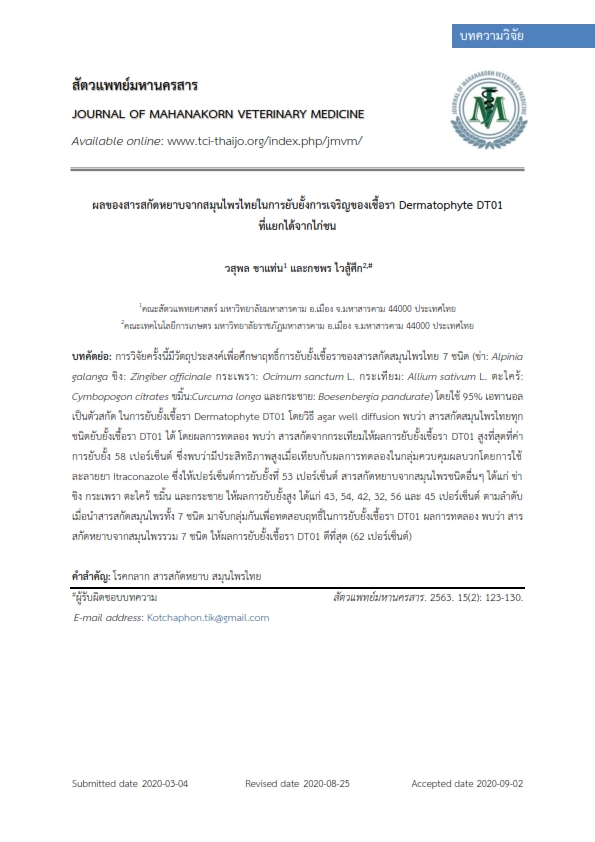Efficacy of crude extract of thai herbal to Inhibit Dermatophyte DT01 isolated from Fighting Cock
Main Article Content
Abstract
This research aimed to study antifungal activity of 7 Thai herbal (Alpinia galanga, Zingiber officinale, Ocimum sanctum L., Allium sativum L., Cymbopogon citrates, Curcuma longa and Boesenbergia pandurate) ethanol extracts against Dermatophyte DT01 by agar well diffusion method. The results showed that all Thai herbal extracts inhibited DT01. The crude extracts of Allium sativum L. showed the highest DT01 inhibitory effect, with 58% inhibition compared to the positive control results by using Itraconazole, which 53% inhibition. Other herbs, including Alpinia galanga, Zingiber officinale, Ocimum sanctum L., Cymbopogon citrates, Curcuma longa and Boesenbergia pandurate showed the high DT01 inhibitory effect as follows: 43, 54, 42, 32, 56 and 45, respectively. The 7 extracted herbs were grouped to test antifungal activity (DT01). The results showed that the crude extracts the best DT01 inhibition (62%) compared to all groups and compared them with the use of coarse extracts from single herbs.
Article Details
References
Chermette, R., L. Ferreiro, and J. Guillot. 2008. Dermatophytoses in animals. Mycopathologia. 166: 385-405.
Havlickova, B., V. A. Czaika, and M. Friedrich. 2008. Epidemiological trends in skin mycoses worldwide. Mycoses. 51(4): 2–15.
Ibrahim, J., M. S. Mohd Yassin, C. B. Chin, L. L. Chen, and N. L. Sim. 2003. Antifungal activity of the essential oils of nine Zingiberaceace species. Pharm. Biol. 41(5); 392-397.
Ilkit, M. 2010. Favus of the scalp: an overview and update. Mycopathologia. 170: 143-154.
Kelly, B. P. 2012. Superficial fungal infections. Pediatr Rev. 33(4): 22-37.
Khosravi, A. R. and M. Mahmoudi. 2003. Dermatophytes isolated from domestic animals in Iran. Mycoses. 46: 222-225.
Meenakshi, S. and S. Richa. 2011. Synergistic Antifungal Activity of Curcuma longa (Turmeric) and Zingiber officinale (Ginger) Essential Oils Against Dermatophyte Infections. J. Essent. Oil-Bear. Plants. 14(1): 38-47.
Murata, M., H. Takahashi, S. Takahashi, Y. Takahashi, H. Chibana, Y. Murata, K. Sugiyama, T. Kaneshima, S. Yamaguchi, H. Miyasato, M. Murakami, R. Kano, A. Hasegawa, H. Uezato, A. Hosokawa, and A. Sano. 2013. Isolation of Microsporum gallinae from a fighting cock (Gallus gallus domesticus) in Japan. Med Mycol. 51(2): 144-149.
O'Gara, E. A., D. J. Hill, and D. J. Maslin. 2000. Activities of garlic oil, garlic powder and their diallyl constituents against Helicobacter pylori. Applied Environ. Microbiol. 66: 2269-2273.
Phitak, T., K. Choocheep, P. Pothacharoen, W. Pompimon, B. Premanode and P. Kongtawelert. 2009. The effects of phydroxycinnamaldehyde from Alpinia galanga extracts on human chondrocytes. Phytochemistry. 70: 237-243.
Siripongvutikorn, S., P. Thummaratwasik, and Y. W. Huang. 2005. Antimicrobial and antioxidation effects of Thaiseasoning, Tom-Yum. LWT-FOOD SCI TECHNOL. 38(4): 347-352.
Vena, G. A., P. Chieco, F. Posa, A. Garofalo, A. Bosco and N. Cassano. 2012. Epidemiology of dermatophytoses : retrospective analysis from 2005 to 2010 and comparison with previous data from 1975. New Microbiol. 35(2): 207–213.
Zafar, K. K. and K. Ratna. 2000 Potent Antifungal Activity of Garlic (Allium Sativum) Against Experimental Murine Disseminated Cryptococcosis. Pharm. Biol. 38(2): 87-100.


